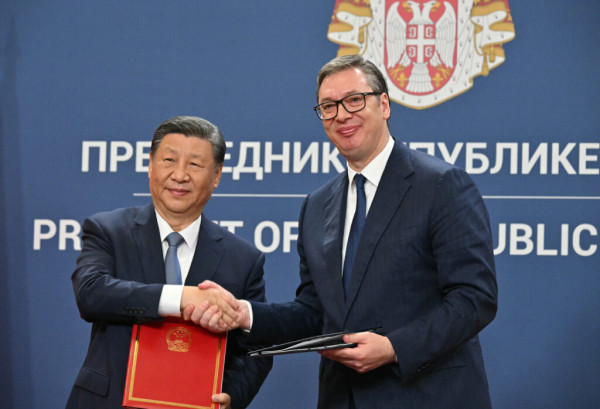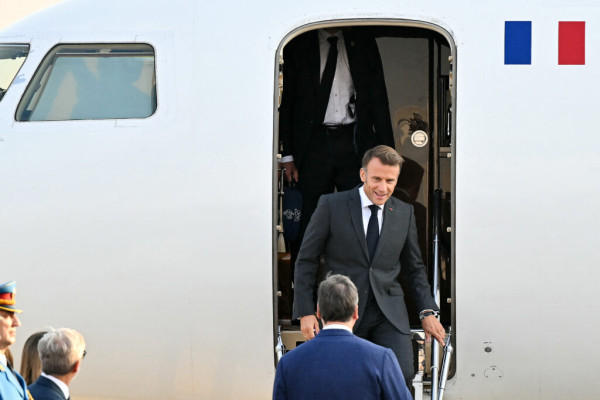From Paris with love: Serbia’s east-west balancing act pays off
BELGRADE — French President Emmanuel Macron and his Serbian counterpart Aleksandar Vučić plugged their ears to the outside noise on Thursday evening to back a series of multi-billion-euro agreements.
The deals were struck despite security concerns regarding Paris's embrace of Belgrade, which maintains close relationships with both Moscow and Beijing, and ongoing large-scale protests in Serbia over the expansion of its lithium mines.
The pair signed 11 bilateral agreements, including a lucrative deal for 12 French-made Rafale fighter jets, the sale of critical raw minerals such as lithium, and the development of a civil nuclear program for Serbia’s increasing energy demands.
“The agreement signed today is historically important,” Macron said. “I see many people tak[ing] umbrage with the fact that Serbia has a relationship with Russia and China … but I respect the sovereignty of Serbia.” He noted that France had received satisfactory guarantees in the negotiation process for the sale of the jets — with talks going down to the wire, according to Vučić.
According to the deal signed with Dassault Aviation, Serbia will receive the jets along with an accompanying logistics package and spare parts valued at €2.7 billion. “This is a huge deal for us. It will contribute to a significant increase in the operational capabilities of our army,” Vučić told reporters.
Additional agreements were signed by representatives of Électricité de France and the French Development Agency.
Vučić, meanwhile, pushed back on questions from French reporters regarding his relationships with Beijing and Moscow.
“I am not going to apologize for this … I know that Emmanuel would like me to introduce sanctions against Russia. But we did not do it and we are not ashamed of our decision.”
During his decade in power, Vučić has enjoyed a close relationship with Moscow, in particular with Russian President Vladimir Putin, who has visited Belgrade twice in the last 10 years.
Vučić also has a close relationship with Chinese President Xi Jinping, who paid a special visit to Serbia as part of his first post-Covid-19 visit to Europe. Chinese state media have termed their bilateral relationship an “ironclad friendship,” a category reserved for countries that Beijing truly values.

Macron’s visit also comes on the heels of large-scale protests against an EU-backed lithium project in the country. When German Chancellor Olaf Scholz, EU Green Deal chief Maroš Šefčovič and Vučić signed a deal formalizing the EU’s support for the mine last month, a key selling point was that the project would bring Serbia closer to the bloc.
But the signing has put Vučić in a difficult spot, reanimating a mass movement against a mine that protesters claim will condemn Serbs to economic exploitation and environmental pollution, and put Western standards further out of reach. Vučić, in response, has accused the protesters of plotting to overthrow him — with the support of the West.
The government, which is led by the Serbian Progressive Party and its political allies, has tried to stifle the widespread discontent by targeting independent news outlets in the country, and has admitted to compiling “lists of enemies of Serbia” and even setting up anonymous political movements to shore up support for the mine.
A special friend
“France loves you as you have loved her!” Macron proclaimed in 2019 during his last visit to the Serbian capital, his heavily accented essays in the local language frequently interrupted by fervent cheers from the large crowd gathered in front of the Monument of Gratitude to France in Belgrade’s Kalemegdan fortress-park.
This time around, the charm offensive was even more effusive. Ahead of his two-day visit to the country, Macron sent a 1,400-word letter to Serbian daily papers, once again waxing lyrical about the “fortitude and vitality of the ties that unite us, the French and the Serbs,” and saying the visit intended to “nurture and deepen our so-precious friendship.”
“The visit is undeniably of great importance to Serbia,” Boško Jakšić, a foreign policy analyst, told POLITICO.
“President Macron has accepted to be the protector of Serbia as one of the key leaders of the European Union … and has often supported Vučić’s policies despite Vučić being the subject of criticism from the European Union due to his autocratic leadership style.”
In his letter, and during their joint address on Thursday, Macron took on the role of a friendly critic attempting to gently nudge Serbia in the right direction.
“We often agree, but even when we don’t agree we always respected each other,” Macron said at the press conference in the Palace of Serbia. “And that’s the basis for the friendship between our two nations, which was launched through war and fighting together for our Europe. Our nations have always stuck together.”
France and Serbia have indeed shared a close relationship since medieval times, with Serbian kings marrying French nobility. Their bond deepened during World War I, as they fought side-by-side on the Thessaloniki front, with France also providing significant humanitarian aid and evacuating Serbian civilians and troops, which suffered massive casualties.
Today, over 80 percent of French investments in the Balkans are in Serbia, while the over 100 French companies in Serbia employ some 12,000 workers.

Crucially, Serbia has counted on France to support it whenever it has been backed into a corner by other European nations. In May, the Parliamentary Assembly of the Council of Europe voted in favor of Kosovo — a former southern province of Serbia that declared independence in 2008, a move that Belgrade has yet to recognize — becoming a member of the human rights organization.
France was among those countries that blocked the final Council of Europe vote, citing Pristina’s inadequate efforts to establish an Association of Serb Municipalities, a political body meant to represent Kosovo’s Serb minority.
For Jakšić, both Serbia and France stand to gain considerably from their renewed alliance.
"The French interests are primarily economic and financial in nature, while the interest of President Vučić is to once again receive cover and support from the West for his own policies,” he said.